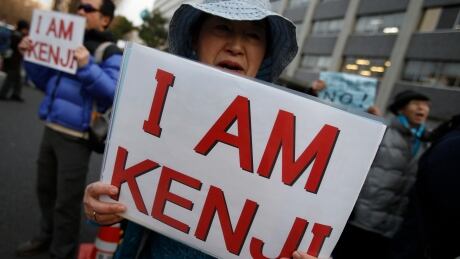TS
letnan.bejo
Japan Hostage Crisis Revives Debate Over Military Force
Government Prepares Legislation Giving It More Freedom Over Self Defense

TOKYO—The Japanese hostage crisis appears certain to play a role in the debate over Japan’s global security posture as Prime Minister Shinzo Abe ’s government prepares legislation that would give it more freedom to use military force.
Mr. Abe’s government on Monday convened a session of parliament in which it plans to introduce legislation that will allow Japan to engage in “collective self-defense,” including aiding allies such as the U.S. in regional conflicts threatening Japan’s security, and to come to the rescue of Japanese citizens abroad.
Koichi Nakano, a political-science professor at Sophia University in Tokyo, said the hostage crisis—in which a Japanese citizen was beheaded by Islamic State militants last week—could strengthen Mr. Abe’s resolve to restyle Japan as a more muscular political actor on the international stage.
“Mr. Abe may use the latest case to raise support for his move to expand the role of Japan’s military,” he said.
Explaining the need for laws supporting more military options, Mr. Abe pointed to the hostage crisis in a TV appearance Sunday, noting that under existing laws, the government’s options were limited.
“The legislation is aimed at protecting the lives and well-being of the people by structuring a seamless legal security structure,” Mr. Abe said during a regular round-table debate on public broadcaster NHK. “For example, if Japanese abroad come under harm’s way as in the recent case, the Self-Defense Forces currently aren’t able to fully utilize its abilities.”
The prime minister says it’s humanitarian aid and that he’s not sending ammunition, weapons or troops, but wars aren’t just about firing guns. Soldiers cannot fight without food.’
—Ichiro Ozawa, a former president of the main opposition Democratic Party of Japan
Many opposition lawmakers have supported Mr. Abe during the hostage crisis—or at least refrained from criticizing him openly. By Sunday, though, some had begun to point to Mr. Abe’s recent trip to the Middle East and offer of $200 million in nonmilitary aid for countries affected by Islamic State as possibly having provoked the group, arguing that a more active role in global security necessarily brings more risk.
“The prime minister says it’s humanitarian aid and that he’s not sending ammunition, weapons or troops, but wars aren’t just about firing guns. Soldiers cannot fight without food,” said lawmaker Ichiro Ozawa, a former president of the main opposition Democratic Party of Japan who now heads a smaller party, on the same NHK broadcast Sunday. “Mr. Abe basically went all the way over there and gave a speech which could be interpreted by the Islamic State as a declaration of war.”
A video released late Saturday showed that one of two Japanese captives held by Islamic State had been beheaded. In it, the other hostage, freelance journalist Kenji Goto, held a photo showing what appeared to be the decapitated head and body of Haruna Yukawa, a self-described military contractor. A voice described as Mr. Goto’s read a statement saying the militants were now demanding the release of a prisoner held in Jordan instead of the $200 million previously sought as ransom.
In an earlier video, released Jan. 20, Islamic State demanded $200 million for the two men, citing the same amount in aid from Japan and contending the money is intended to help “kill Muslims.” Mr. Abe has repeatedly stressed that Japan is providing nonmilitary humanitarian assistance, rejecting Islamic State’s claim.
Since assuming power in late 2012, Mr. Abe has sought to raise Japan’s international security profile. Last year, his cabinet approved a revised interpretation of the nation’s pacifist constitution that would ease long-standing restrictions on military activities outside Japanese territory. Parliament must still pass legislation to flesh out Mr. Abe’s vision.
The reinterpretation, which followed a yearslong debate in Japanese policy circles, is mainly intended to counter China’s growing regional power and to show the U.S. that Japan is willing to assume a more equal role in regional security. The latter element has also required Japan to align itself more closely with its Western allies on Middle East policy and the fight against terrorism. It is this new geopolitical role that many in Japan have argued could invite trouble such as the hostage crisis.
Mr. Abe has stressed that Japan has real national interests in the Middle East, which provides almost all of its crude-oil imports. His pledge of $200 million, specifically for nation’s affected by Islamic State’s expansion in Syria and Iraq, was part of Japan’s $2.5 billion aid package offering humanitarian and infrastructure assistance for the entire region.
Still, in a sign of unease among the Japanese people, a poll conducted by Kyodo News on Sunday found that 50.7% of respondents said the government should take more time before submitting legislation related to collective self-defense. Only 21% said the government should move ahead.
The Kyodo poll found that 60.6% of respondents supported the government’s response to the hostage situation, versus 31.2% that didn’t. Support for Mr. Abe’s cabinet stood at 52.8%, little changed from the previous survey taken in December when the ruling
http://www.wsj.com/articles/japan-ho...rce-1422283548
===================================================================================================
apakah jepang akan berubah dalam waktu dekat??
Diubah oleh letnan.bejo 27-01-2015 09:00
0
2.4K
1
Thread Digembok
Mari bergabung, dapatkan informasi dan teman baru!
Militer
20KThread•7.3KAnggota
Urutkan
Terlama
Thread Digembok